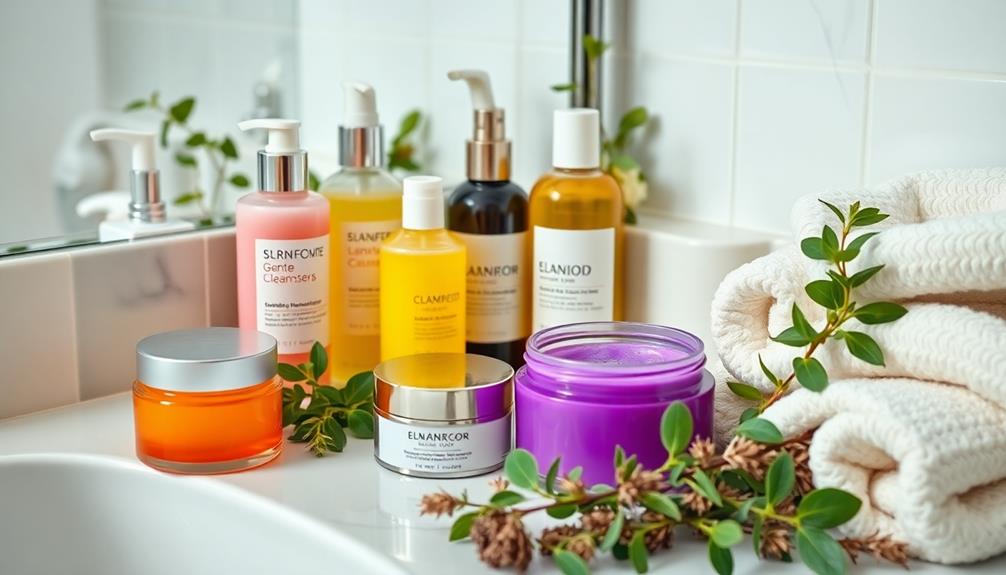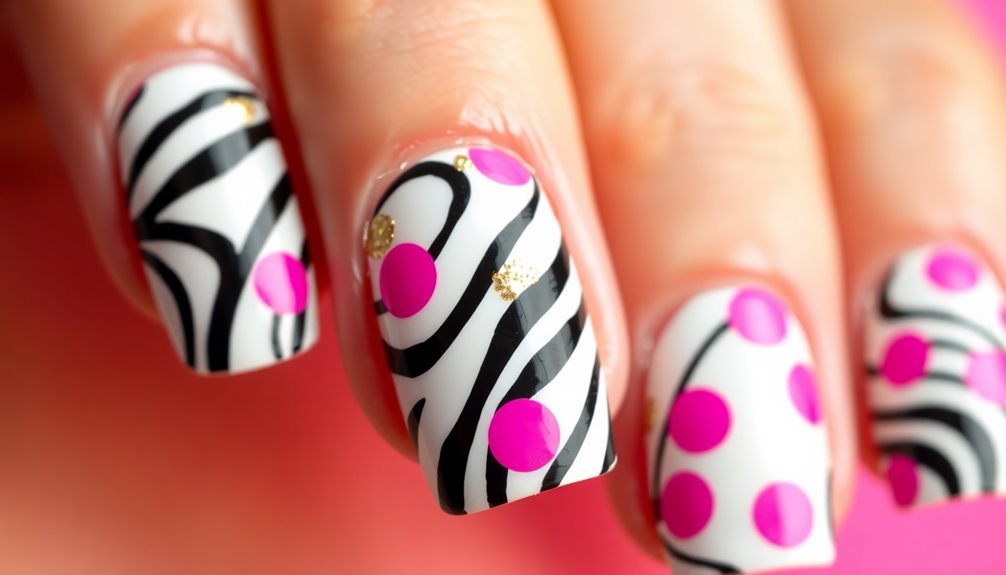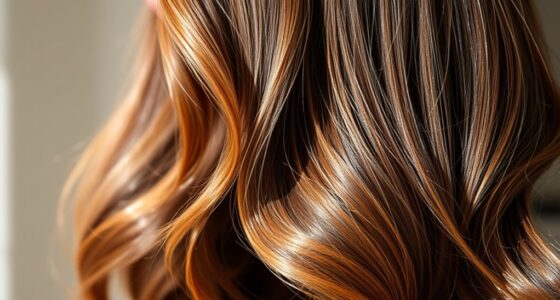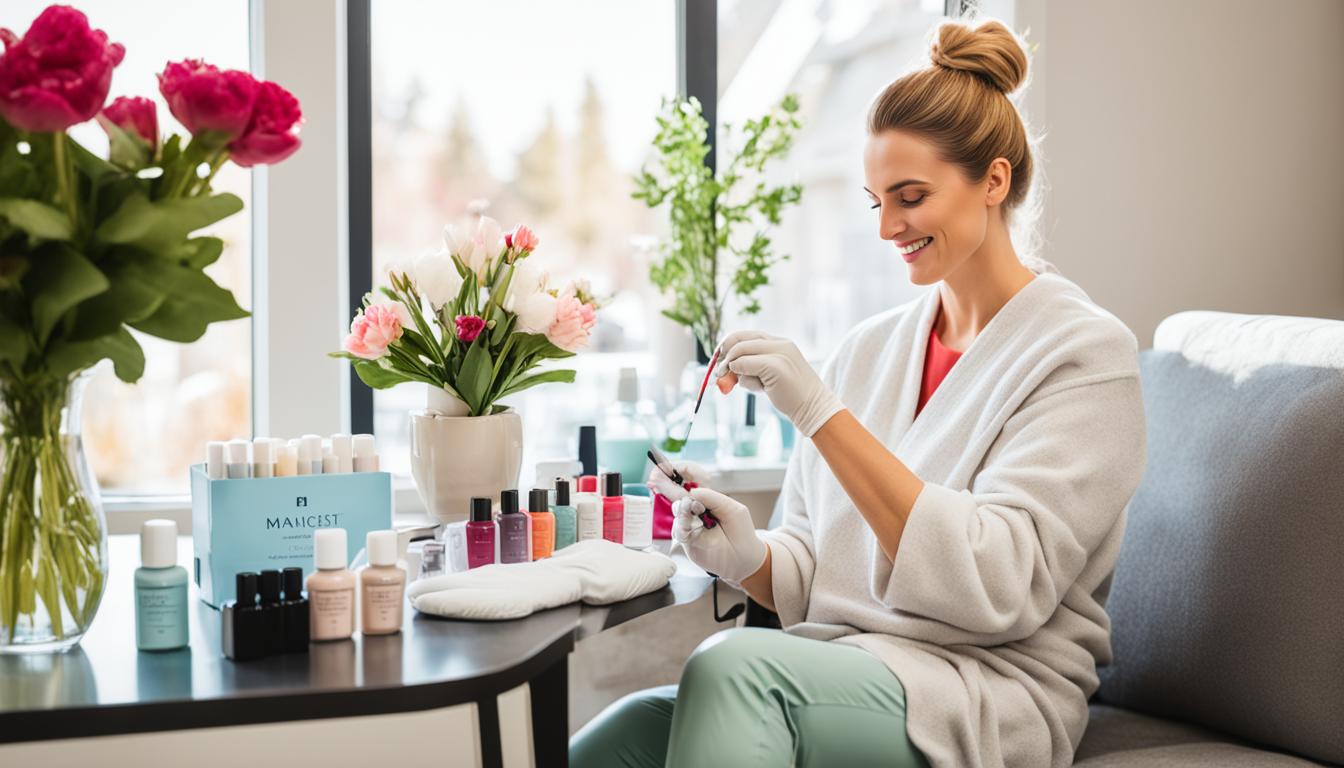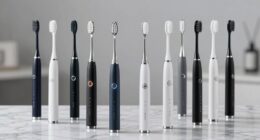Dealing with maskne can be tough, but you can take steps to prevent and treat breakouts. Start by choosing breathable masks made of 100% cotton and wash them daily. Cleanse your face gently after wearing a mask to remove sweat and bacteria. Use non-comedogenic moisturizers to protect your skin barrier. Incorporate benzoyl peroxide or salicylic acid for effective treatment on breakouts. Keep your skincare routine simple and monitor your skin's reactions for the best results. If you're curious about more tips and tricks for healthier skin, you'll find plenty of helpful insights ahead.
Key Takeaways
- Choose breathable, hypoallergenic mask materials to minimize moisture and friction that contribute to maskne.
- Wash fabric masks daily with unscented, hypoallergenic detergent to eliminate bacteria and dirt buildup.
- Use gentle cleansers and non-comedogenic moisturizers to maintain clear skin and protect the skin barrier.
- Apply targeted treatments like benzoyl peroxide or salicylic acid on affected areas to reduce inflammation and breakouts.
- Monitor skin reactions and adjust your skincare routine as necessary to manage irritations and prevent further breakouts.
Understanding Maskne
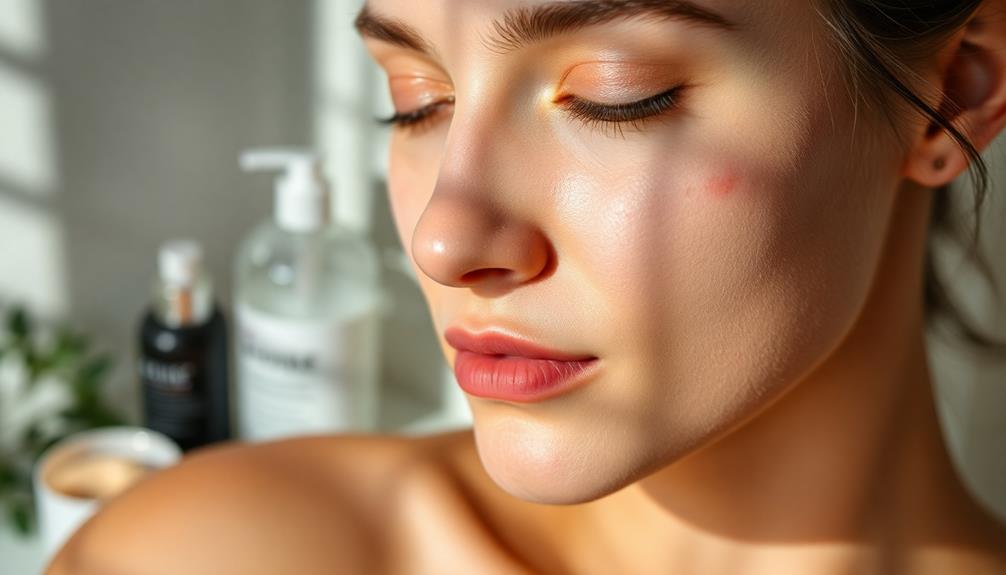
Maskne, a term you've likely encountered during the pandemic, refers to the acne and skin irritations that can arise from wearing face masks. This condition often affects areas like your cheeks, chin, and nose, where masks typically sit.
The increase in humidity and friction from face masks can lead to clogged pores, making it easier for bacteria to thrive and worsen pre-existing skin conditions. To help soothe your skin, consider incorporating herbal teas into your routine, as certain varieties may promote relaxation and support skin health through their antioxidant properties, such as popular herbal teas like chamomile and peppermint.
If you have sensitive skin or conditions like rosacea, you're at a higher risk of experiencing symptoms of maskne. The occlusive environment created by your mask traps sweat, oil, and dead skin cells, which can result in breakouts and skin irritation.
Prolonged mask usage might even disrupt your skin's natural barrier, increasing irritation and potentially leading to acne cysts.
To combat maskne, you'll want to focus on prevention and treatment in your skin care routine. Consider using non-comedogenic products that won't clog pores, and make sure to cleanse your face regularly to remove trapped impurities.
Causes of Maskne
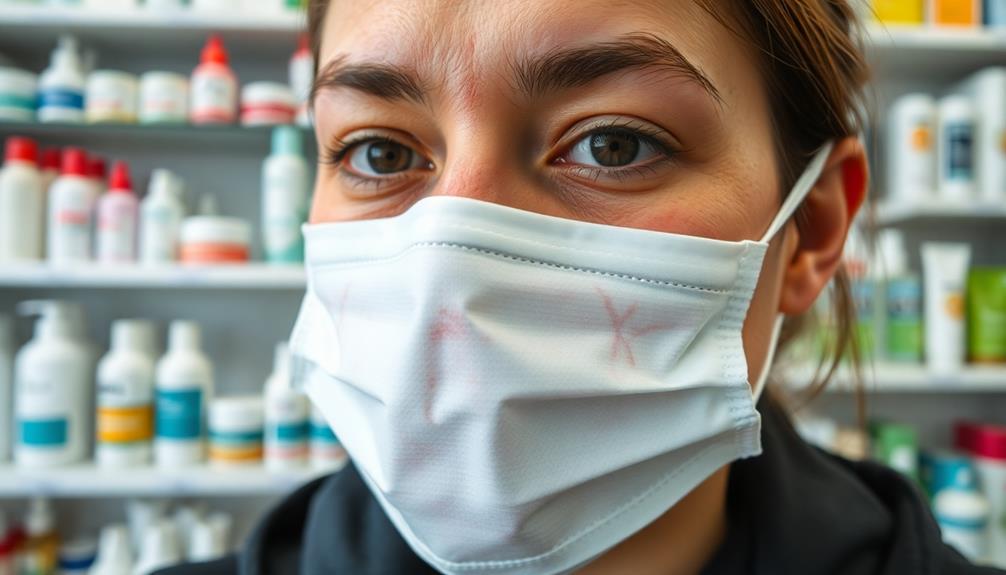
Wearing a mask can considerably contribute to skin issues, particularly with the development of maskne. This condition primarily arises from clogged pores due to the accumulation of oil, dead skin cells, and bacteria, which is exacerbated by prolonged mask-wearing.
The humidity trapped beneath the mask from your breath and sweat creates a perfect breeding ground for acne-causing bacteria. It's crucial to maintain a consistent skincare routine and consider products designed for sensitive skin, much like how vet-approved recommendations for ideal nutrition can benefit pets with specific dietary needs.
Additionally, the friction from the mask rubbing against your skin can lead to irritation, especially in sensitive areas like your nose and cheeks. This constant movement heightens the likelihood of breakouts.
Prolonged use of masks can also disrupt your skin barrier, increasing sensitivity and irritation, which can worsen existing skin conditions like acne or rosacea.
Moreover, don't overlook the possibility of allergic reactions. Some people might react negatively to mask materials or the detergents used to wash them, further contributing to skin issues.
Treatment Options
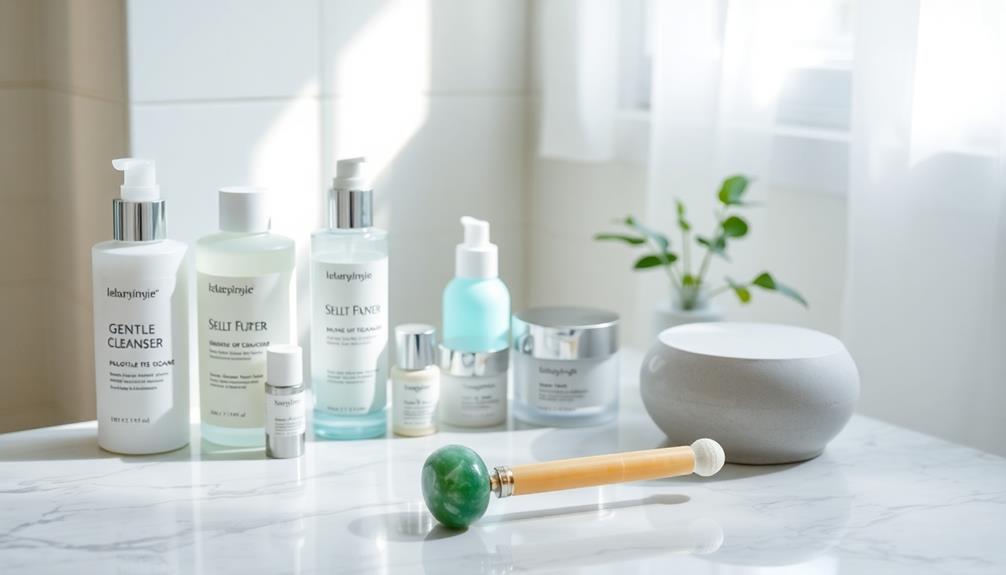
To effectively tackle maskne, it's vital to incorporate targeted treatments into your skincare routine. Start with products containing benzoyl peroxide or salicylic acid, as these ingredients effectively target clogged pores and reduce inflammation caused by mask-related skin issues.
Pair these with a gentle cleanser for daily cleansing, helping to keep your skin clear and fresh. Additionally, maintaining good overall health, including oral hygiene, can play a role in preventing skin issues, as poor dental health may contribute to systemic inflammation that can affect your skin. For more insights, check out how dental health impacts overall well-being.
If you experience persistent irritation, consider using an over-the-counter hydrocortisone cream to alleviate redness and swelling. For those facing severe cases of maskne, prescription topical retinoids can improve skin texture and reduce breakouts, providing a more long-term solution.
In addition to these treatments, light exfoliation is essential. It can help manage folliculitis and prevent further breakouts under your mask.
Don't forget to apply a non-comedogenic moisturizer before putting on your mask; this will protect your skin barrier and reduce irritation from materials.
Prevention Strategies

Effective prevention strategies can make a substantial difference in minimizing the risk of maskne. Start by choosing breathable, hypoallergenic materials for your masks, like 100% cotton. This helps reduce moisture and friction, both of which contribute to breakouts.
It's important to wash your fabric masks daily using unscented, hypoallergenic detergent. This practice eliminates dirt and bacteria that can exacerbate skin issues. Additionally, maintaining proper hydration is essential for overall skin health; hydrated skin can better withstand the effects of wearing a mask and prevent irritation.
Consider incorporating moisturizers and hydration techniques into your routine to enhance your skin's resilience. Before putting on your mask, apply a noncomedogenic moisturizer. This creates a protective barrier that helps prevent irritation and breakouts.
Additionally, try to limit heavy makeup under your mask. Doing so reduces the risk of clogged pores and irritation in those areas.
Don't forget to regularly change or wash your reusable masks; avoid reusing disposable masks to maintain hygiene. Accumulated oils and pathogens can lead to increased skin problems, so keeping your masks clean is critical for prevention.
Skincare Routine Adjustments
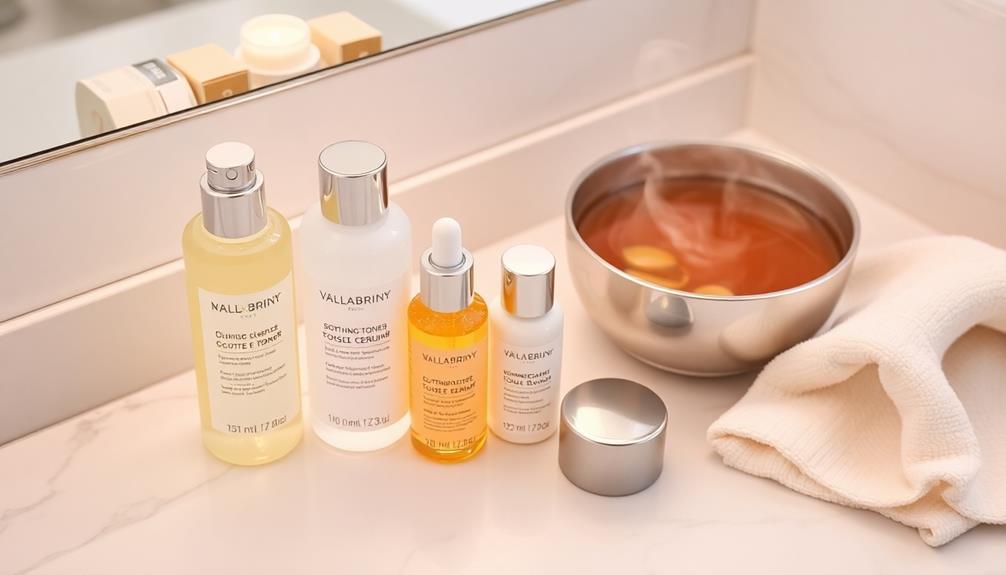
Adjusting your skincare routine is key to managing maskne effectively. Start by simplifying your regimen to focus on gentle cleansers and non-comedogenic products. This helps prevent clogged pores and minimizes breakouts.
Incorporating essential oils like tea tree oil, known for its antimicrobial properties, can also support skin health and prevent infections. Use a gentle cleanser twice daily, especially after wearing your mask, to remove sweat, oil, and bacteria that contribute to maskne.
Incorporate lightweight moisturizers enriched with hydrating ingredients like hyaluronic acid to maintain your skin's barrier function without feeling heavy. Be cautious with harsh treatments such as retinoids or strong chemical exfoliants; they can increase skin sensitivity and irritation, especially during prolonged mask use.
Monitor how your skin responds and adjust your routine as needed. Prioritize soothing ingredients like aloe vera to calm any irritation.
Importance of Mask Hygiene
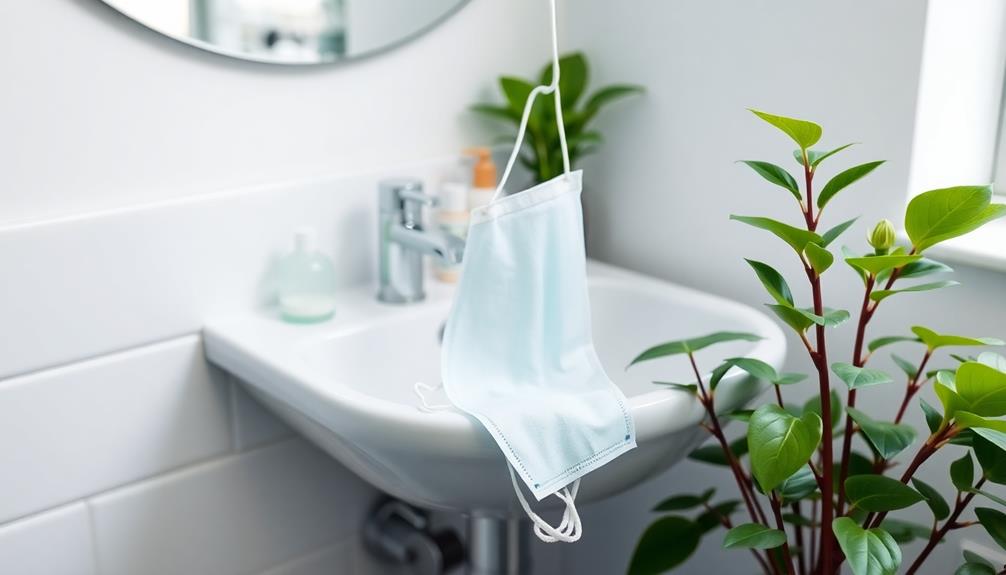
Maintaining proper mask hygiene is vital for preventing maskne and keeping your skin healthy. When you wear masks, they can quickly become dirty from oil, sweat, and bacteria. Daily washing of cloth masks with unscented, hypoallergenic detergent helps eliminate these impurities, reducing the risk of skin irritation and breakouts.
Additionally, ensuring good indoor air quality by using HEPA filters can help reduce airborne irritants that may exacerbate skin issues.
If you opt for disposable masks, remember to discard them after each use. This practice prevents the accumulation of pathogens that may worsen your skin condition.
Also, storing clean masks in a sealed container or bag protects them from contaminants, ensuring they're hygienic for your next use.
If you're engaging in physical activities or sweating, it's important to change or wash your mask regularly. This helps reduce moisture buildup, which can lead to acne.
Always follow the care instructions for your masks, focusing on proper washing and drying techniques. This way, you maintain their shape and effectiveness while minimizing skin irritation.
Post-Mask Care

After you've taken off your mask, it's important to care for your skin to prevent any irritation or breakouts.
Start by washing your face with a gentle cleanser to remove trapped sweat, oil, and bacteria. This step is vital for preventing breakouts and maintaining healthy skin.
Next, follow up with a non-comedogenic moisturizer to replenish hydration and protect your skin barrier, minimizing irritation caused by prolonged mask wear.
If your skin feels irritated or shows signs of redness, consider applying a soothing product with ingredients like aloe vera or chamomile. These can help calm your skin and reduce discomfort.
Remember to frequently clean your reusable masks, ideally after each use, to reduce bacteria buildup, following CDC guidelines.
Incorporating these post-mask care steps into your routine will help maintain your skin's health and prevent maskne.
If you experience persistent skin issues, consulting a dermatologist for tailored recommendations and treatment options is a wise choice.
Taking these measures will guarantee your skin stays clear and healthy, even with regular mask use.
When to Seek Help

Sometimes, recognizing when to seek help for skin issues like maskne can be challenging. If you notice persistent acne or skin irritation that doesn't improve after two weeks of at-home care, it's time to consult a dermatologist for a professional evaluation. Ignoring these symptoms might lead to worse breakouts or complications.
Additionally, understanding your emotional state during this time is important, as stress can exacerbate skin conditions, making it beneficial to contemplate professional help when needed. You should seek immediate medical attention if you see signs of a skin infection, such as increased redness, swelling, pain, or pus drainage. These symptoms require prompt care to prevent further issues.
Dermatologists can provide tailored treatment plans, including prescription medications, especially for severe cases of maskne that over-the-counter products can't alleviate.
If your maskne symptoms worsen or cause significant discomfort, don't hesitate to reach out for expert advice. A dermatologist can help identify underlying issues and offer effective treatment options.
With the convenience of telehealth consultations, you can easily access care from the comfort of your home. Remember, addressing your skin concerns early can prevent more serious problems down the line, so don't wait too long to seek help.
Frequently Asked Questions
How Do You Prevent Breakouts From Masks?
To prevent breakouts from masks, choose breathable fabrics, wash masks daily, and apply a noncomedogenic moisturizer beforehand. Limit heavy makeup, and maintain a gentle skincare routine to keep your skin healthy and irritation-free.
What Is the Best Treatment for Maskne?
Mastering maskne management means you'll need mild cleansers, targeted treatments like salicylic acid, and soothing creams for redness. Don't forget a non-comedogenic moisturizer to maintain hydration and consult a dermatologist for personalized solutions.
Why Does My Face Break Out When I Wear a Mask?
When you wear a mask, trapped oil, sweat, and bacteria can clog your pores. The humid environment promotes bacterial growth, while friction causes irritation, leading to breakouts, especially in sensitive areas like your jawline and nose.
How to Get Rid of MAS?
To get rid of mask-related breakouts, cleanse your face twice daily, use a non-comedogenic moisturizer, apply spot treatments, and wash your masks regularly. If issues persist, consult a dermatologist for tailored solutions.
Conclusion
In your battle against maskne, remember that the right strategies can make all the difference. By understanding the causes and implementing effective treatments, you’re already on the right path. But what if there’s one essential step you’re missing? One that could transform your skin and boost your confidence? Stay vigilant, keep adjusting your routine, and don’t underestimate the power of post-mask care. The solution might be closer than you think—are you ready to discover it? To truly conquer maskne, it’s important to prioritize post-mask care and to make sure you’re giving your skin the attention it needs after wearing a mask. By incorporating the perfect tan tips into your skincare routine, you can ensure that your skin is getting the best possible care, helping to minimize breakouts and keep your complexion glowing. Don’t overlook the importance of post-mask care and the impact it can have on your overall skin health.
